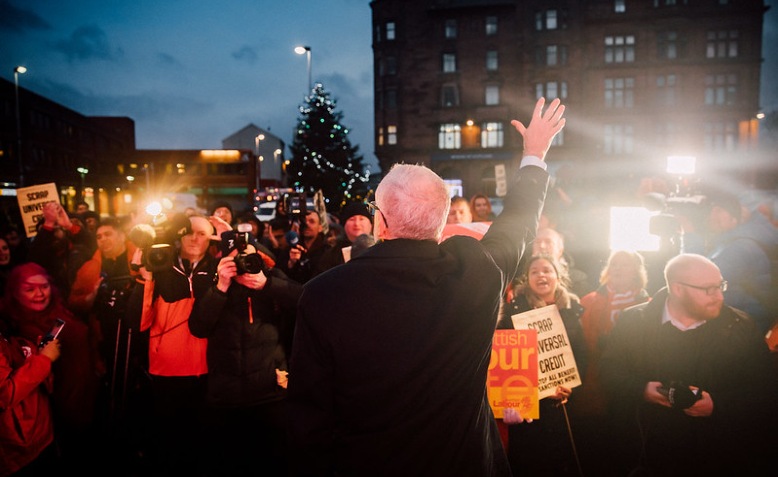 Jeremy Corbyn at a rally in Glasgow, December 11 2019. Photo: Jeremy Corbyn flickr
Jeremy Corbyn at a rally in Glasgow, December 11 2019. Photo: Jeremy Corbyn flickr
Although a Corbyn-led government would undoubtedly have spared a great deal of tragedy, the gains made in the last five years are undeniable, argues Ben Myers
As we move forward into a brave new world, a country gripped by pandemic, almost at a standstill, we can be forgiven for not focussing on the past. More specifically, the last five years of a Corbyn-led Labour party.
It is easy to say, for those who did not support Corbyn, that his 5 years were an unrequited failure, he never gained the office of Prime Minister, he never secured a majority, and so on and so forth. These criticisms not only lack depth, they are an attempt to discredit broader leftist thought and action; an attempt to silence the left and maintain the status quo of a society domineered by ‘Great Men’ and the corporations they run.
It is simply dishonest to ignore the successes of Jeremy Corbyn, and the movement that swelled around him, experiencing growth in membership and heightened interest as people were galvanised by one of few leftist figures in public office, in Labour, and out of Labour; like The People’s Assembly Against Austerity and Stop the War Coalition. These themselves are achievements that, on their own merit, are admirable; and far from the complete failure that those with a Blairite disposition would like you to think.
We can look at examples of victories achieved by Corbyn’s Labour in halting the eroding of the rights of working class people, such as defeating the Enterprise Bill, which would have seen shops extending Sunday Trading hours, as if retail workers didn’t have a hard enough lot in life, talking from familial experience. Theresa May being consigned to the history books as the weakest Prime Minister in recent memory after facing the biggest defeat in the history of the House of Commons makes it is clear the Jeremy had his fair share of Parliamentary success.
What’s more telling, however, is that the zeitgeist, the overall attitude of the country right now, has been shifted somewhat. In these times of crisis, class consciousness is so important, solidarity is key, and Jeremy Corbyn’s message of an egalitarian, socialist society has really help to thrust those ideas through the Overton Window, now so much so that we see capitalists like Branson and Bezos not as interesting figures to fawn over, but people to be weary of, and to place at the top of the tower that needs toppling.
What was politically unacceptable 5 years ago, the idea of nationalised, centrally provided broadband for example, is now recognised (especially during this pandemic) as a bold and modern idea; one that sees internet not as a simple commodity, but essential to our ever more connected lives. Even the Johnson’s Government has admitted it is a ‘proper public utility‘.
Not to mention the £300 plus billion the government has piled into the economy to keep it afloat during lockdown, it is a tacit admission that 11 years of austerity and cuts to public spending have been a deadly lie that has left many in ruin and even caused deaths. It is now widely accepted that Tory austerity has been the driving factor in destroying communities and creating a gig economy with low wages and little workers’ rights.
This amount of money (14% of the UK’s GDP) is higher than what Labour’s 2019 manifesto was expected to cost over a full term of Parliament – so much for ‘fiscal responsibility’. Surely this is the ultimate victory of Corbynism, a government more willing to intervene in the economy – albeit to protect the monied classes from financial harm, rather than protecting the interests of the working class. We’ve seen that our PM is more willing to sacrifice the lives of everyday people rather than damage the pockets of the elite, so at least on the face of it, it highlights a shift in perception and mainstream analysis, where Labour were slammed for wanting to invest and spend, Johnson is not.
For those who say it is wrong to politicise the Coronavirus crisis, we know that if Jeremy had won in ’17, or ’19, we would have been in a stronger position to deal with the crisis, a better funded and larger capacity NHS, with access to adequate PPE and testing, nationalised public transport that could have applied unilateral travel restrictions. This crisis is political, the contradictions of capitalism are laid bare in a crisis like this, and even though Jeremy’s parliamentary socialism wasn’t the peak ideal of a society that we envision, the reality is it would have been close. Certainly better than the neoliberal, uber-capitalist, Tory hellscape in which we find ourselves.
In summary, we cannot tell what the UK would have been like if Jeremy Corbyn hadn’t won the Leadership election of 2015, but it is fair to say it would largely have been business as usual by those standards. The world is a better place to have had the Corbyn project in it, and although we are not much further forward than we were in 2015, as a movement, as socialists, we now have a much greater launching pad. As he said himself, he was proven absolutely right.

